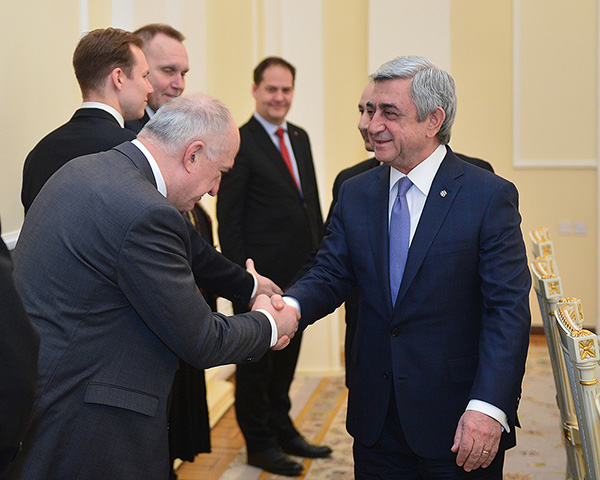President Serzh Sargsyan received today a delegation headed by the Chairman of the Foreign Relations Commission of the Parliament of the Kingdom of Sweden Kenneth G Forslund.
The President of Armenia welcomed the guests from the friendly Sweden and stressed the role of the parliamentarians in the development and strengthening of the interstate relations. Noting that in recent years the relations between Armenia and Sweden show dynamic advancement, Serzh Sargsyan ensured that Armenia is interested in maintaining the dynamics with Sweden – one of Armenia’s important and reliable partners in the Scandinavian region. According to the President, the desire to give a new quality to the bilateral relations is conditioned not only by political and economic interests but also by our common system of values. Sweden is an exemplary country for Armenia considering her dedication to the common European system of values, mature democracy, high level of adherence to human rights and the rule of law. Armenia is striving to achieve the same, implementing towards that end continuous and comprehensive reforms.
The Chairman of the Foreign Relations Commission of the Parliament of the Kingdom of Sweden noted that the agenda of the delegation’s visit to Armenia is rather full and substantial. He underscored that the issues related to the European Neighborhood Policy and Eastern Partnership remain under the constant attention of the Swedish Parliament and are debated actively. “There is an inter-partisan consensus on this issue in our Parliament, and regardless of the party affiliation, there is a support for this cooperation and particularly for the programs which are initiated by the European Union with the Eastern Partnership,” said Kenneth Forslund.
At the meeting, along with the issues related to the Armenian-Swedish bilateral relations, the parties spoke about the negotiations on the new Armenia-EU framework agreement, Armenia’s cooperation with the European structures as well as the upcoming parliamentary elections in Armenia and their importance at this stage of transfer to the parliamentary system of governance.























































